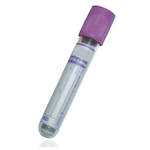Suitable Specimen Types
- EDTA Whole Blood
- CSF
Sample Preparation
Please note that we will attempt to amplify thevirus if less than 500 cp/ml (must be above 40 cp/ml)
Turnaround Time
14 daysHIV 1 Integrase genotypic resistance testing
General Information
Genotypic HIV-1 Integrase resistance testing is the current recommended method for determining integrase drug resistance in HIV infection. Genotypic resistance data provides information on the presence/absence of drug resistance mutations, which is used as a predictor of virological response to therapy. This aids clinical decisions regarding therapy changes. Choosing the most appropriate therapy regime improves patient management and reduces the cost of care.
The methodology for genotypic HIV-1 resistance for the integrase inhibitors involves extraction of RNA, reverse transcription of RNA to DNA in a one-step RT-PCR and nested PCR amplification, population sequencing and sequence analysis
Sample Stability
Freshly drawn specimens (whole blood) may be held at 2 to 30°C for up to 6 hours prior to centrifugation. Plasma and CSF samples are stored for 2 years at -20°C.
Patient Preparation
For taking blood or CSF samples we recommend that users follow either their local protocols or “The Royal Marsden Manual of Clinical Nursing Procedures”.
Lavender top blood (EDTA) sample
- Sufficient blood for the test should be drawn into lavender topped (EDTA) vacuum tubes
- Invert tube 8–10 times.
HIV-1 Integrase genotypic resistance testing is available on our request form from the following link HIV RESISTANCE REQUEST FORM
CSF samples
Undiluted CSF sample should be sent in a sterile universal container.
Request forms
Please ensure as much clinical information as possible is provided on the request form.
Specifications
- EQA Scheme?: Yes
- EQA Status: QCMD and HIV Antiviral Sequencing Panel- Sequencing group, PHE Colindale
